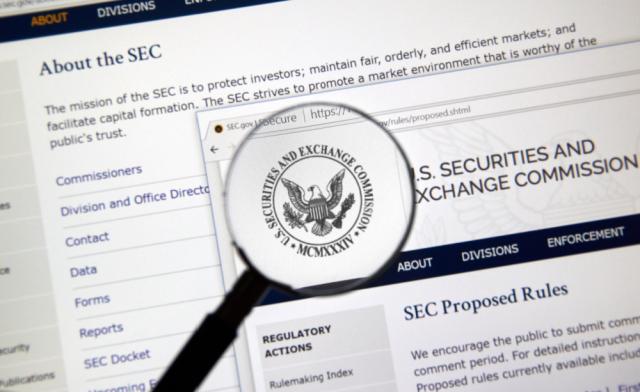
The proposed rules regarding climate-related risks create several new areas of liability, Hillary Holmes, partner and capital markets global co-chair at Gibson, Dunn & Crutcher, told Hart Energy. (Source: Shutterstock.com)
The U.S. Securities and Exchange Commissions’ (SEC) proposal on climate disclosures has received several written comments over the past few weeks, with companies asking for significant changes and clarity to disclosure requirements.
In an official letter to the SEC, Pennsylvania-based natural gas producer CNX Resources Corp. said the proposal “injects confusion” and challenges investors’ access to “truly comparable data,” especially around Scope 3 emissions.
“What does this definition mean in practical application?” CNX questioned in its letter to the SEC, asking for a “clearer definition” for investors to compare the greenhouse-gas (GHG) emissions of an electric vehicle (EV), for instance, with those of a vehicle powered by gasoline, diesel, natural gas or any other fuel. 
“This burden could put additional pressure on the energy supply chain and may discourage further U.S. energy production, which is the last thing the country and the world needs right now.”—Leslie Beyer, CEO, Energy Workforce & Technology Council
“The proposed climate rules create inconsistent and highly subjective standards for reporting Scopes 1, 2 and 3 carbon dioxide emissions across different industries and companies,” CNX CFO Alan Shepard said in an official statement.
“This in turn may create confusion and misinformation when investors assume the emissions data reported by each registrant were developed from the same methodology, scope and assumptions,” he added.
Energy Workforce & Technology Council also expressed serious concerns around the SEC’s Scope 3 requirements, adding that it would put a “significant burden” on the energy sector and the economy.
“This burden could put additional pressure on the energy supply chain and may discourage further U.S. energy production, which is the last thing the country and the world needs right now,” Energy Workforce CEO Leslie Beyer said in a statement.
Last week, investment giant BlackRock Inc. also came out against the SEC’s proposed mandate of Scope 3 emissions disclosure citing reasons such as insufficient data quality and reporting capabilities.
The firm noted that it prefers a more flexible approach of “comply or explain” and looks for companies to focus only on emission categories that are material.
“As investors, we use Scope 3 emissions as a proxy metric [among others] for the degree of exposure companies have to carbon-intensive business models and technologies. However, we do not believe the purpose of Scope 3 disclosure requirements should be to push publicly traded companies into the role of enforcing emission reduction targets outside of their control,” the firm said in a statement.
Liability implications
The proposed rules regarding climate-related risks create several new areas of liability, noted Hillary Holmes, partner and capital markets global co-chair at Gibson, Dunn & Crutcher.
“The proposed climate rules create inconsistent and highly subjective standards for reporting Scopes 1, 2 and 3 carbon dioxide emissions across different industries and companies. This in turn may create confusion and misinformation when investors assume the emissions data reported by each registrant were developed from the same methodology, scope and assumptions.”—Alan Shepard, CFO, CNX Resources Corp.
“The comments on the proposed rules that have been posted to date demonstrate that energy companies are quite concerned about this increased level of liability on newly developed and poorly defined disclosure requirements, relative to the benefit to the investor,” Holmes told Hart Energy.
For instance, she said the proposed rules would treat all climate-related disclosures as “filed” rather than “furnished,” which means the disclosures would not only be subject to general anti-fraud liability under the federal securities laws, but also to the strict liability sections of the securities laws.
Another concern raised by energy companies regarding the SEC’s proposed rules is that managing the liability risk and ensuring compliance with the proposed rules is expensive and time-consuming.
“This is true both the larger companies who already voluntarily provide climate-related disclosures and the smaller companies who have limited resources, all of which strive to manage their G&A expenses in the best interests of shareholders,” Holmes said.
‘Underprepared’
In addition to confusion surrounding the definition of Scope 3 emissions and increased liability, nearly two-thirds of senior decision makers across industries said they are underprepared to meet regulatory reporting mandates, according to a new report released by Workiva.
“The comments on the proposed rules that have been posted to date demonstrate that energy companies are quite concerned about this increased level of liability on newly developed and poorly defined disclosure requirements, relative to the benefit to the investor.”—Hillary Holmes, partner, Gibson, Dunn & Crutcher LLP
Companies are grappling with how to accurately report the “E” in ESG, the study shows, specifically regarding carbon accounting level of data and calculating greenhouse gas protocols and communicating corporate value to address investor and wider stakeholder needs.
Company leaders are also calling on the need for technology to deliver transparent, accurate data to key stakeholders, which is critical ESG reporting. Globally, three out of four respondents noted that technology was important for compiling and collaborating on ESG data, as well as validating data for accuracy and mapping disclosures to regulations and framework standards.
Despite the roadblocks, reporting ESG data has improved not only stakeholder and investor relationships, but also created cost savings and a reduction of long-term risk to the company, the study found.
“We saw across the board different levels of value drivers including growth in customer retention, investor growth, risk protection and cost savings,” explained Mandi McReynolds, head of ESG at Workiva.
The survey shows that companies now have a designated role handling ESG reporting, which has become more than just a “checkbox exercise,” Mandi said.
“When you have that collaborative cross functional team engaging in [ESG] data in real time on an ongoing basis, you have decision-useful data that can increase business value,” she noted.
Recommended Reading
TotalEnergies Starts Production at Akpo West Offshore Nigeria
2024-02-07 - Subsea tieback expected to add 14,000 bbl/d of condensate by mid-year, and up to 4 MMcm/d of gas by 2028.
Tech Trends: SLB's Autonomous Tech Used for Drilling Operations
2024-02-06 - SLB says autonomous drilling operations increased ROP at a deepwater field offshore Brazil by 60% over the course of a five-well program.
Seadrill Awarded $97.5 Million in Drillship Contracts
2024-01-30 - Seadrill will also resume management services for its West Auriga drillship earlier than anticipated.
Well Logging Could Get a Makeover
2024-02-27 - Aramco’s KASHF robot, expected to deploy in 2025, will be able to operate in both vertical and horizontal segments of wellbores.
Remotely Controlled Well Completion Carried Out at SNEPCo’s Bonga Field
2024-02-27 - Optime Subsea, which supplied the operation’s remotely operated controls system, says its technology reduces equipment from transportation lists and reduces operation time.





